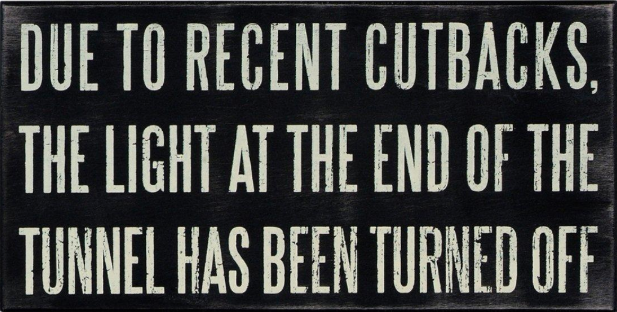It is often said going through a divorce is similar to grieving a death. This is an excellent analogy. Both are deaths of sorts, both come with feelings of disbelief and an initial inability to accept what has happened….one day you’re fully aware of the loss and your mind accepts it and the next you literally can’t believe its happened. You just can’t accept your life as you know it has been profoundly altered. Both divorce and death come with a sense of loss that can feel all-consuming. The future seems void…often you feel literally closed off without the relationship as if the future is a hole one is traveling through and it has suddenly closed. In fact, I recently saw a humorous sign that just about sums up divorce:

Although these feelings are very common after divorce, it is important to be mindful that they are indeed that …feelings. As we therapists like to say, feelings aren’t facts. The light at the end of the tunnel has not been shut off. The future is not hopeless…even though our feelings might be attempting to convince us it is.
What is also true about the grieving process of divorce is that like grieving over a death, a significant part of the work to be done has to do with grieving the actual loss but also grieving the hopes, dreams and expectations associated with the loss. In my work as a therapist, I have found this to be of profound importance. It becomes important for the individual grieving the marriage to also grieve perhaps their dream that they would grow old with this person, that they would see their children off to college together or perhaps grieve their dream of raising children in an in-tact family. Some who had begun intensive couples work prior to the divorce might also need to process feelings associated with the hope that the counseling would “save” their marriage or that they would finally receive that longed apology for what they believe their spouse did to harm them.
Divorce recovery work requires grieving what we believe would have brought the relationship and thus our lives back to “normal.”
What those who do the brave work of divorce recovery find is that while working through the end of a marriage, most come to appreciate things in their new life through a new lens. They learn to slowly embrace what I like to call their “new normal.”
Embracing a new normal means that while I don’t want to accept that this loss (the divorce) has occurred and things are vastly different than I would have dreamed (i.e. children no longer live with me 100% of the time), I can still create my own new normal that is empowering in the midst of swallowing these difficult changes. For example, I can do things as simple as sending out Holiday cards with pictures of my new family to inform the community that this is how my family will be defined. I can use some of the money that was going toward couples counseling to provide counseling for my children or join a divorce recovery group for processing grief and/or infidelity. It is extremely healing to process loss with others who have experienced similar loss or trauma. You experience the sense that you are not alone and that some of the feelings and struggles that accompany the loss of divorce are universal.
New normal might not look as you would have dreamed “normal” to look before the divorce but it most assuredly will bring adventures and experiences that wouldn’t have come down your path prior to your divorce.
While embracing your new normal, it is important to remember that grief will come in waves. The sea can seem calm and peaceful and you can be hopeful about the future when all of the sudden a wave of grieve comes washing over you, feeling as if it just might take you under. It’s important to keep in mind that in grief as with the waves, the intense feelings wash in and out. When it feels as if the future will never be bright again, remember the wave is washing over you and will soon return to sea and leave you to catch your breath and reach out for the hand of another. When the waves seem to be crashing into you relentlessly and envelop you for too long, that’s a good sign it’s time to reach out and get help from a skilled therapist.
Your new normal after a divorce might not feel “normal” for a while, but remember neither did parenting or moving out of your parent’s home. Life brings many changes that require adapting to situations in which you don’t know the future and/or it wasn’t exactly what you planned. Creating and adapting to a “new normal” is an important skill. Honing this skill during divorce is often painful and frightening; however, these intense feelings don’t mean your not doing the work of divorce recovery. They simply mean your human.


